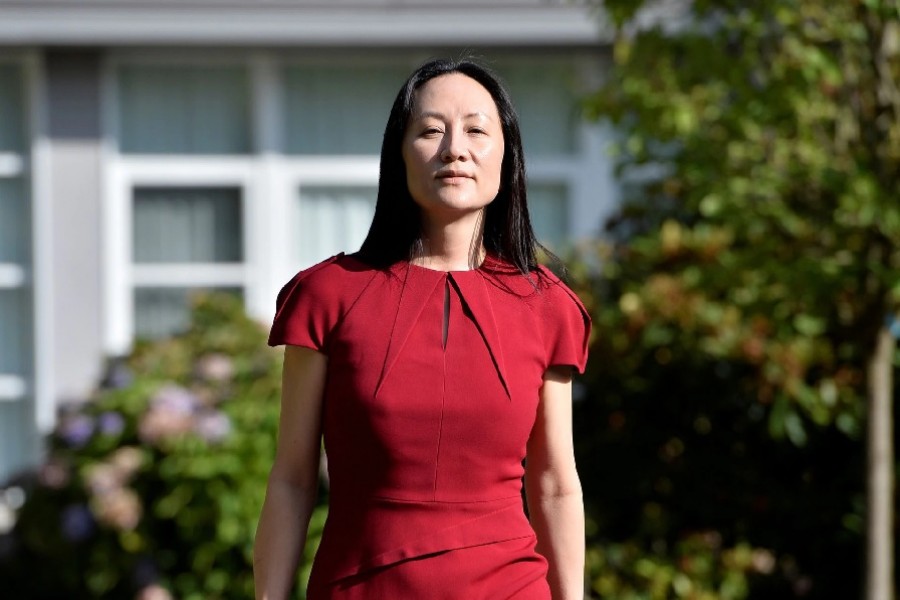Huawei Technologies Chief Financial Officer Meng Wanzhou has reached an agreement with US prosecutors to resolve the bank fraud case against her, according to sources familiar with the matter, in a process that should allow her to leave Canada.
The US government said it will appear in Brooklyn federal court to discuss a resolution of charges against Huawei Technologies Chief Financial Officer Meng Wanzhou, according to a Friday court filing.
Meng was arrested at Vancouver International Airport in December 2018 on a US warrant, and was indicted on bank and wire fraud charges for allegedly misleading HSBC about Huawei's business dealings in Iran.
The deferred prosecution agreement, reported first by Reuters, pertains only to Meng and US charges remain against the company, according to another person familiar with the matter.
Such a resolution would remove one of several major disputes between the world's two biggest economies. The agreement could also potentially pave the way for the release of two Canadians, businessman Michael Spavor and former diplomat Michael Kovrig, who are held in China after being arrested shortly after Meng was taken in custody in 2018. In August, a Chinese court sentenced Spavor to 11 years in prison for espionage.
A spokeswoman for Huawei declined to comment. A spokesman for the US Attorney's office in Brooklyn declined to comment. An attorney for Meng could not be immediately reached for comment. Meng has said she is innocent and has been fighting extradition to the United States from Canada. Meng is confined to Vancouver and monitored 24/7 by private security that she pays for as part of her bail agreement.
Under a deferred prosecution agreement, the government agrees to refrain from prosecuting a defendant for a period of time, and drops the case altogether if the defendant complies with specified conditions.
Huawei, a telecommunications equipment giant, was placed on a US trade blacklist in 2019 that restricts sales to the company for activities contrary to US national security and foreign policy interests. The restrictions have hobbled the company, which suffered its biggest ever revenue drop in the first half of 2021, after the US supply restrictions drove it to sell a chunk of its once-dominant handset business and before new growth areas have matured.
The criminal case against Meng - the daughter of Huawei founder, Ren Zhengfei - and Huawei is cited in the blacklisting. Huawei is charged with operating as a criminal enterprise, stealing trade secrets and defrauding financial institutions. It has pleaded not guilty.
Articles published by Reuters in 2012 and 2013 about Huawei, a Hong Kong-registered company Skycom and Meng figured prominently in the US criminal case against her. Reuters reported that Skycom had offered to sell at least 1.3 million euros worth of embargoed Hewlett-Packard computer equipment to Iran's largest mobile-phone operator in 2010. At least 13 pages of the proposal were marked "Huawei confidential" and carried Huawei's logo.
Reuters also reported numerous financial and personnel links between Huawei and Skycom, including that Meng had served on Skycom’s board of directors between February 2008 and April 2009.
Judicial hearings in her extradition case in Vancouver wrapped up in August, with the date for a ruling to be set on Oct. 21.
A Canadian government official said Ottawa would be making no comments until the U.S. court proceedings were over. Kovrig’s wife declined to comment.
CHINA vs USA
Huawei has become a dirty word in Washington, with a knee-jerk reaction by China hawks in Congress to any news that could be construed as the United States is going soft, despite Huawei being hobbled by US trade restrictions.
President Trump politicized the case when he told Reuters soon after her 2018 arrest that he would intervene if it would serve national security or help secure a trade deal. Meng's lawyers have said she was a pawn in the political battle between the two super powers.
Senior US officials have said that Meng's case was being handled solely by the Justice Department and the case had no bearing on the U.S. approach to ties with China.
During US Deputy Secretary of State Wendy Sherman’s July trip to China, Chinese Vice Foreign Minister Xie Feng insisted that the United States drop its extradition case against Meng.
US officials have acknowledged that Beijing had linked Meng's case to the case of two detained Canadians, but insisted that Washington would not be draw into viewing them as bargaining chips.


